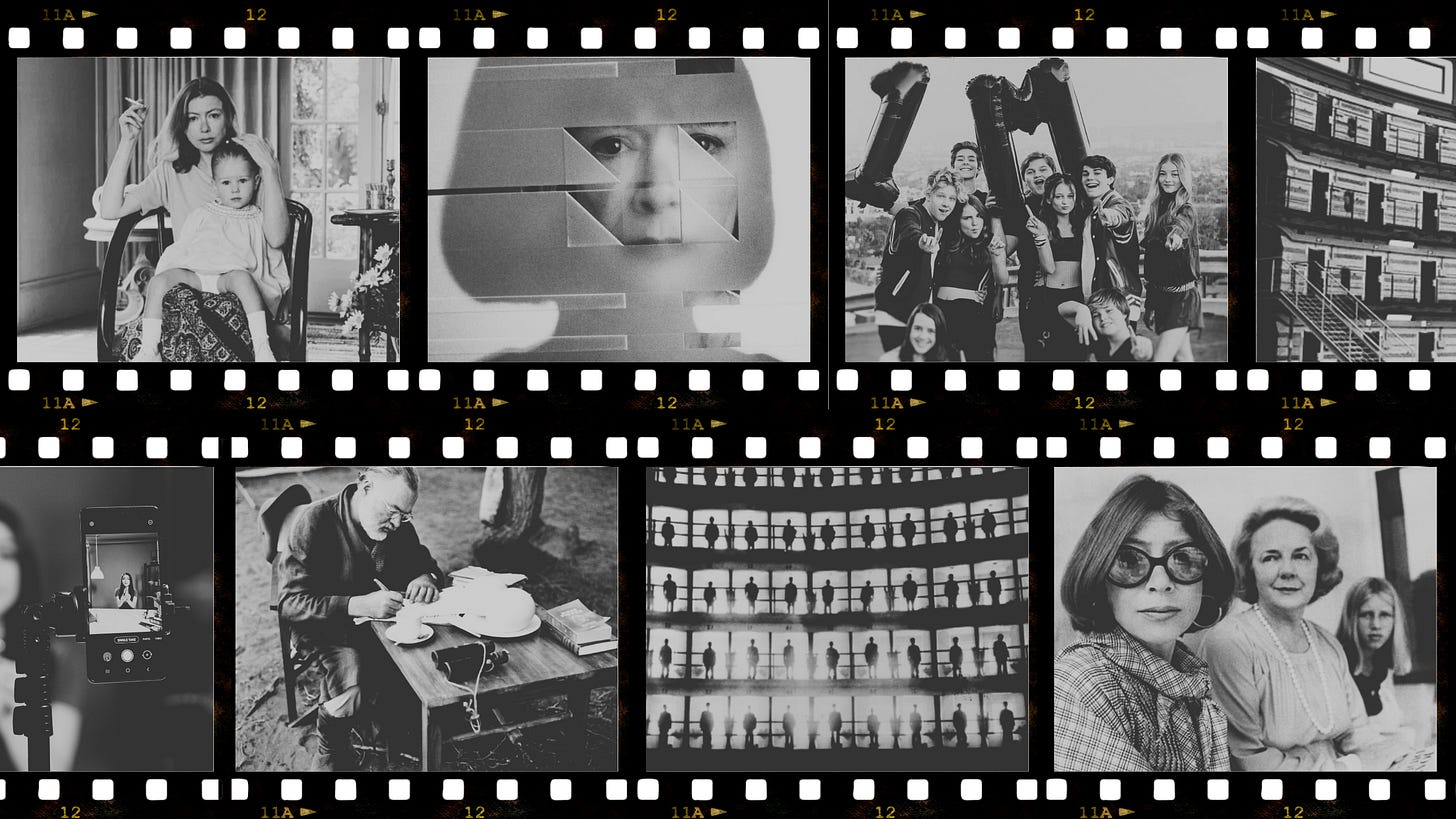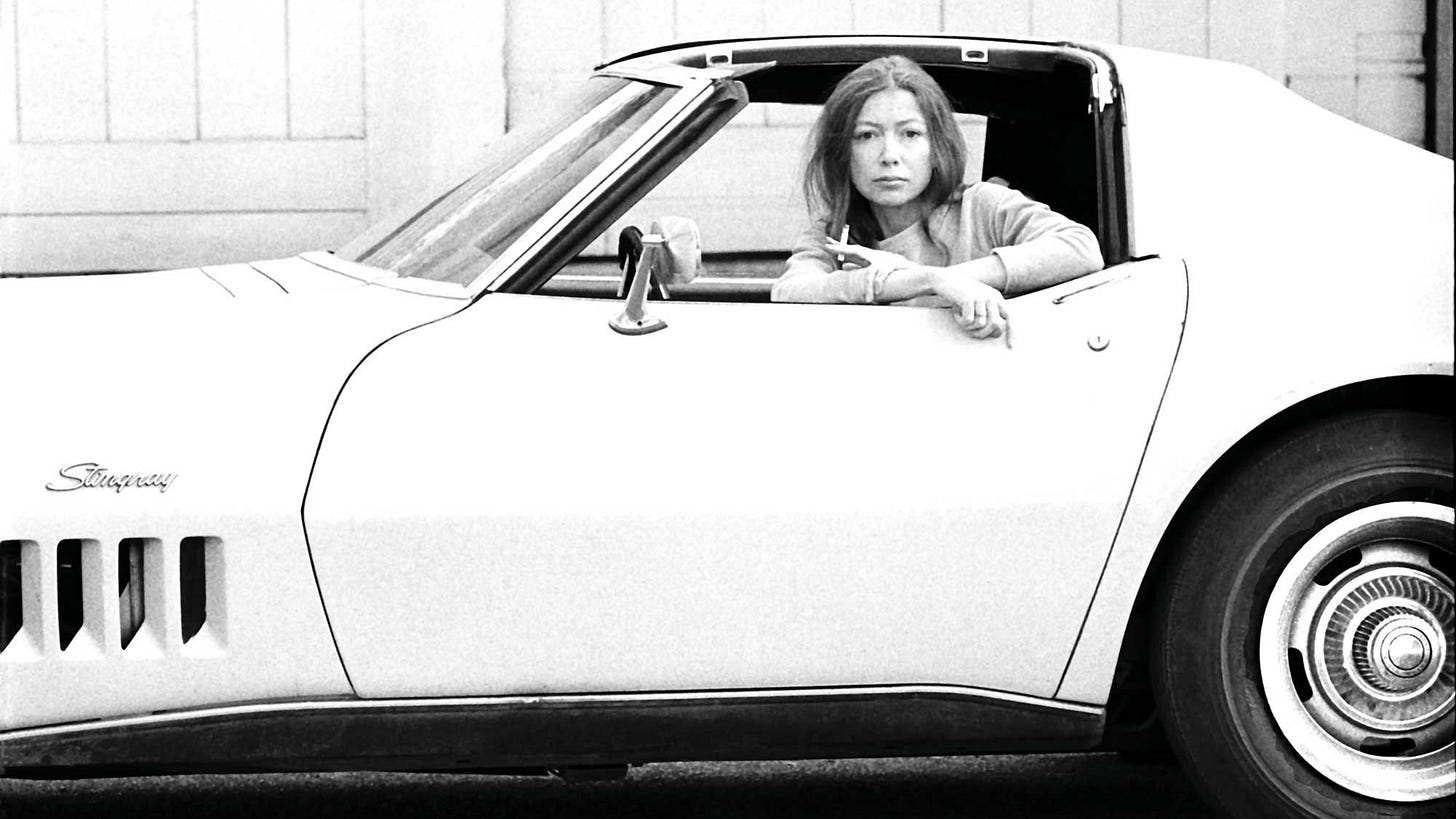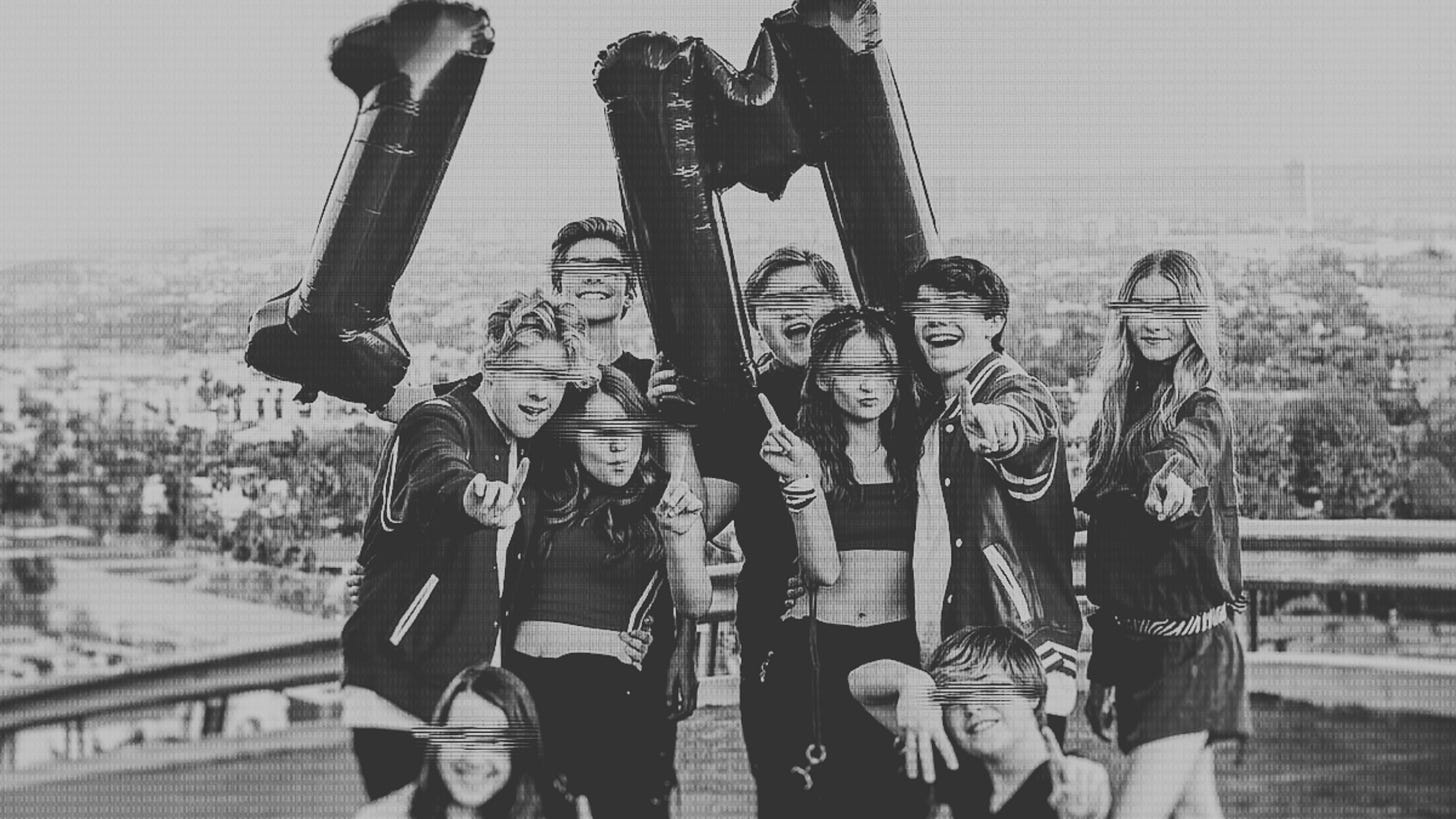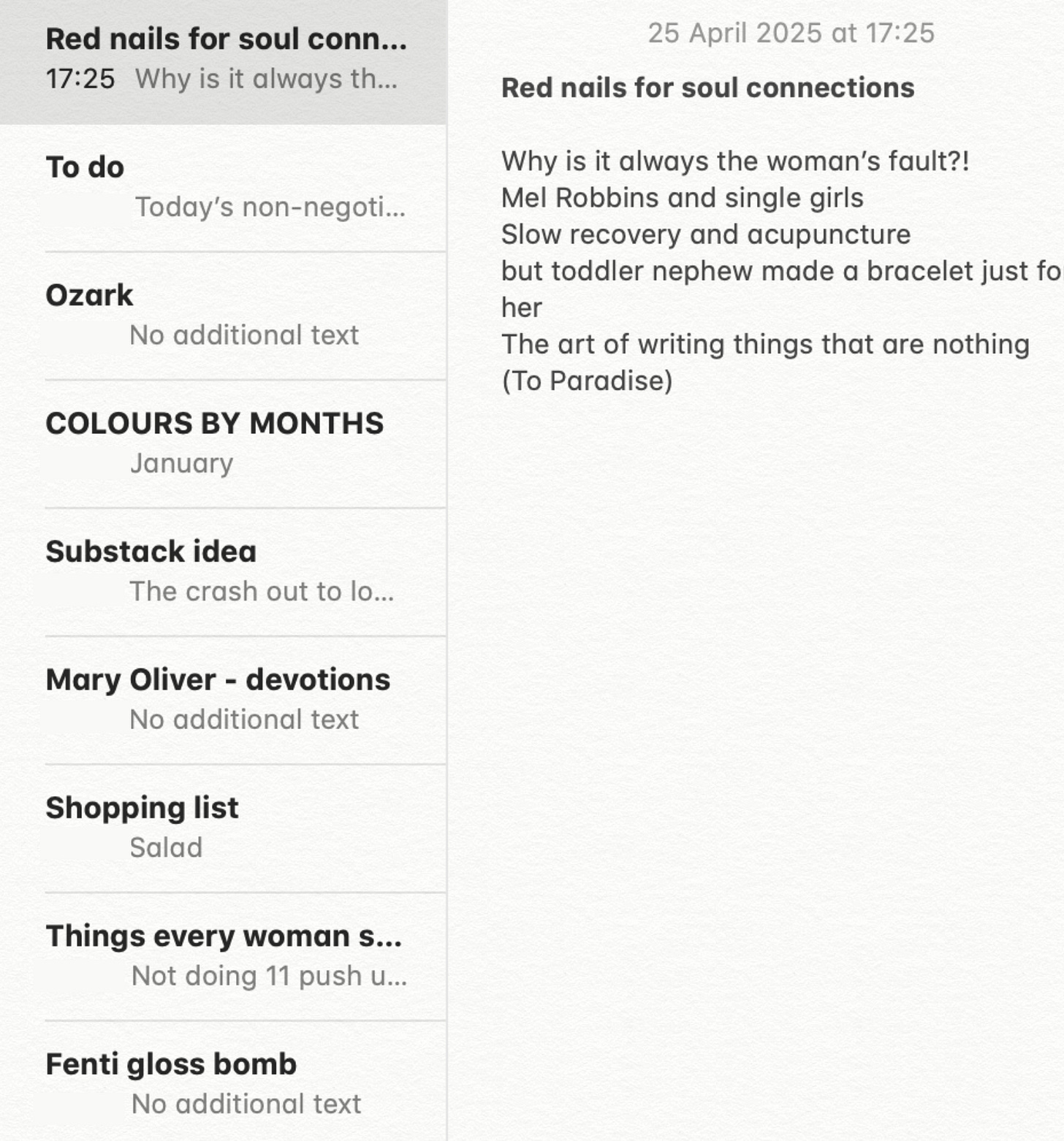How would you feel if it happened to you?
Smile, you're on social media
“This is a man to whom words mattered. He worked at them, he understood them, he got inside them […] His wish to be survived by only the words he determined fit for publication would have seemed clear enough” — Joan Didion, writing about the posthumous publication of Hemingway’s unfinished work, published in The New Yorker in 1998.
I. The Diary Dilemma
Joan Didion, by all accounts, was a woman to whom words mattered. Because she was a writer; and not only that, but a perfectionist, too.* Shortly after writing the above piece, about Hemingway, Didion started writing a diary about what she talked about in therapy: strands of anxiety and depression, her daughter’s struggles with alcoholism, often whole conversations written in black and white staccato. Addressed to her husband, who died a few years later, the book was found in a drawer after her death in 2021, with no instructions as to how it should be treated. It was published this week.

According to The Observer, her close friends and family – who ‘wished to remain anonymous’ were not happy with the decision to publish:
I have no doubt that this document will further our collective astonishment at Joan’s work, but I also cannot think of anything more private than notes kept about one’s psychiatry sessions. It’s not my place to say what Joan would have wanted, but as someone who loved her very much, the publication of these pages makes me terrifically sad.
Another added:
The collective feeling in her inner circle is that her privacy has been betrayed. While I, of course, understand the public thirst for this document, given Joan’s extraordinary place in American letters, Joan was nothing if not meticulous and intentional with the details she decided to share – and not share – in The Year of Magical Thinking and Blue Nights. Anything beyond that seems to me a tremendous betrayal of her privacy by the people she trusted the most.
It's true: although these books detail in great depth Didion’s experience of impossible, heart-wrenching grief, very little is revealed about certain personal aspects of her life, including details about her daughter. As Taylor Antrim writes in Vogue, “both books are breathtakingly personal as they relay these events, but they also leave gaps, occlusions. Blue Nights is preoccupied with death and loss, but one is never quite sure what exactly Quintana suffered from—and her drinking is only briefly addressed.” In other words: in the writing she wanted to publish, she lets us in, whilst keeping us at a carefully measured distance. A meticulous, conscious choice from a perfectionist, wouldn’t you say?
In her essay about Hemingway’s posthumous publications, Didion explored what she called ‘the systematic creation of a marketable product’:
So successful was the process of branding this product that in October, according to the House & Home section of the New York Times, Thomasville Furniture Industries introduced an “Ernest Hemingway Collection” at the International Home Furnishings Market in High Point, North Carolina, offering “96 pieces of living, dining and bedroom furniture and accessories” in four themes, “Kenya,” “Key West,” “Havana,” and “Ketchum.”
And so history repeats itself. Because Didion, too, was famous. In fact, her following is often described as ‘cult-like’. And something we all know about ‘cult-like’ followers? They’re insatiable. Her unused notebooks sold at auction for $9,000 for goodness’ sake. $9,000! And now, just four years after her death, Didion’s private journals themselves become another part of her brand; another marketable product.
Which brings us to the real question: at what point does the potential for a ‘marketable product’ become more important than authorial consent?
II. The children are not alright
Piper Rockelle may, or may not be, a girl to whom language matters. Things that do seem to matter to her: going to the gym, wearing pink, dancing on cars, and getting views.
Because Piper Rockelle has only just turned 17, but she’s been a full-time influencer since the age of nine. On Instagram, she has 6.3M followers. On YouTube? 12.1M. This week, she starred as the central – although voiceless (she refused to comment) – figure on Netflix’s new docuseries: ‘Bad Influence: The Dark Side of Kidfluencing’. The series tells the story of Piper’s ‘Squad’, comprised of other children also wanting social media fame, which was managed by her mother, Tiffany Smith. Per The Guardian:
In 2022, 11 former members of the Squad filed a lawsuit against Smith and Hill, alleging violations of child labour laws, alongside being subject to “inappropriate, offensive and abusive treatment” including “wildly offensive and sexually explicit comments” from Smith.
The programme notes a study that found that 60% of content discovered on the computers of people sexually interested in children came from social media sites, and that about 92% of an audience for teen girl influencers is likely to be adult men.
A crucial part of this documentary is how it draws attention to the lack of legal protection for children placed in this position. Part of the problem, I think, is that it’s so pervasive. We’re used to watching children grow up in the public eye; children of A Listers (who go on to become the dreaded ‘nepo babies’), for example, and child stars themselves. But social media is still in its infancy. The youngest children to go viral on YouTube are only just reaching their twenties. So many of the ‘lifestyle influencers’ whose children they rely on for content are still only toddlers. They have no comprehension of what social media is. Meaning: they cannot consent to it.
For The New Yorker, Jessica Winter criticised the parents who filed the lawsuit in “Bad Influence”:
After all, they saw what Rockelle had—all that her mother had given her—and decided that they wanted the same for their own children. That’s why they’re in the documentary. That’s why we’re giving them views. There will always be somebody willing to stick the pins in the baby’s foot.
You probably have home videos. I know I do. And I love watching them. Tiny me with those chubby legs, toddling around and saying all sorts of nonsensical—and pretty embarrassing—things. I can’t quite imagine how violated I might feel if these moments had been broadcast at the time. Not only that, but if my unbridled playfulness, or my sleepless nights, or my sickness, were filmed, edited and uploaded to make money. How I’d feel if every single person I ever met knew what I looked like as a new-born, fresh from the womb, crumpled and squealing; as a three-year-old screaming for ice cream, or for attention, or for the woes of the entire human experience because isn’t being a child so hard? How my entire life would be defined by how I was once a child whose parent thought it was okay to repeatedly stick a pin in my foot and film it for the world to watch, and laugh at, and criticise.
III. Smile, you’re on social media
I have no idea if the woman who was filmed giving birth in a waiting room, without her consent, is someone to whom words matter. In fact, I know little to nothing about her. I don’t know her name, or her star sign, or what she called her child. I don’t know if the experience of going viral in the most vulnerable moment of her life changed her at all. All I know is that what she experienced, for me, anyway, is a stark warning. How the hell has it become so normalised for us to film strangers in public? Why do we think this is okay?*
There’s a name for it, now. It’s called panopticontent:
“We’re living in sort of a self-induced surveillance state, where no longer is it necessarily the government panopticon, but it’s now everyone else getting their phones out and filming and surveillant, constantly” — Jenna Drenten, associate professor, Quinlan School of Business at the Loyola University Chicago studying digital consumer culture, in Buzzfeed News
According to VOX, panopticontent—‘nonconsensual voyeurism’—is some of the most highly viewed on the internet. And yes, it might be funny, or heart-warming, or whatever. A fuzzy, completely forgettable twenty seconds for you; an entire life irrevocably altered, for them.

If you’re still not convinced, let me ask you this: how would you feel, if it happened to you?
If one, miniscule moment of your life—perhaps crossing the street, or crying on the tube, or taking out the bins in sweatpants and greasy hair—went viral? If thousands of people started criticising and overanalysing every second of the video: your expression, your posture, your (‘disgusting’ / ‘ugly’ / ‘gross’) demeanour? If a sweet conversation with the man sitting next to you on a plane turned into a viral #planebae moment where millions of people started #shipping you with a stranger, and people who actually know you accuse you of being unfaithful to your long-term partner?
What then?
IV. Legacy v. intrusion (or: ‘mortal humiliation’)
As Cassandra Dimitroff writes for RUSSH, about the publication of Didion’s journals:
Consent is really central to the morality of this argument. And in really black-and-white terms: a person who is dead cannot give consent. Written consent in a will, or the finishing of a work on the brink of completion are one thing, but it’s trickier to decipher whether an artist’s intent is clear when these are not the case […] Posthumous publishing, then, seems to sit at the fault line between reverence and exploitation, between legacy and intrusion.
Of course, so many books are published posthumously, including some of my favourite works; The Opposite of Loneliness by Marina Keegan, Maurice by E.M. Forster, The Diary of Anne Frank, and pretty much the entirety of Emily Dickinson’s oeuvre are all great examples. I don’t pretend to be an expert on the ethics of posthumous publication, but it all hinges on how to uphold a delicate balance between the author’s wishes, and the legacy of their work.
Without the journals of Plath, or Woolf—between whose pages I spent the majority of my teenage years—we simply wouldn’t have the same breadth of understanding about their works as we do today. But they were published a respective twenty-thirty years after these women died. And I think this might be the difference.
If ‘posthumous publishing, then, seems to sit at the fault line between reverence and exploitation, between legacy and intrusion’, can the same be said for child influencing, or panopticontent?
I don’t think so. Because there simply is no ‘reverence’ or ‘legacy’ in these situations. What we’re left with, then, is simple: exploitation, and intrusion. Voracious voyeurism, and a hunger for virality that obliterates everything else.
V. The organising principle
Joan Didion, by all accounts, was a woman to whom words mattered. So I think it’s particularly interesting that her journals start like this:
Re not taking Zoloft, I said it made me feel for about an hour after taking it that I’d lost my organizing principle, rather like having a planters’ punch before lunch in the tropics.
Because what is the difference between raw, unedited thoughts and a finished manuscript? An organising principle. The fundamental idea that takes fragments and turns them into a structured argument, or story. As she wrote, of Hemingway in that article I’ve already quoted so many times in this piece: ‘the publication of unfinished work is a denial of the idea that the role of the writer in his or her work is to make it.’ Because it’s not just the writer’s raw thoughts, ideas, experiences or scribbles in her notes app that makes a work of art: it’s the organising principle, the editing, the way she works with those to create something out of them – something she might feel comfortable to call art, and finally, to publish. That process of turning art into a product which Joan Didion herself described as ‘the mortal humiliation of seeing one’s own words in print.’
Sometimes, as we float through these days and watch as the world falls apart around us, I wonder whether we might, too, have lost our organising principle. Societally, or culturally, or whatever. Whether we’re so caught up in a marketable product, in the potential for virality and the dollar signs that rotate in flashy gold around that concept, that the ethics of consent is no longer in consideration. That it’s now normal to scroll through Instagram and see various toddlers eating mashed banana and banging their plastic spoons against their plastic plates; new-borns still curled in foetal positions who ‘still think they’re in the womb’; that every other TikTok is someone doing something weird/entertaining-but-not-illegal in [insert public place here].
So excited are we, so eager, so greedy for views and clicks and engagement and a brief moment in the sun (and also maybe a pay-out), that we ignore glaring ethical issues that come alongside making that content. So entitled are we to the lives of others that it doesn’t cross our minds when they slip across our feeds. Because consent isn’t just about sex. It’s also about one powerful question that could be applied to so many areas of this messy life: how would you feel, if it happened to you?*
It's all very well to consume entertaining content, but how would you feel if it were you who’d been filmed, covered in vomit on the tube on the way home from a work Christmas drinks? If your worst moments were captured on camera? If they had been, for your whole life, because your parents thought it was a good idea to use you for content? If your deepest fears—or the contents of your notes app—were leaked, right now, and suddenly everyone knew that you’ve never had sex or you don’t really love your grandmother (sorry, Shosh, I borrowed yours there).
What if this became our organising principle, our collective refrain: how would you feel, if it happened to you?
Would it change anything? I’m not sure. But I’d like to think so.
*Footnote 1: ‘Perfectionism can also take the form of spending most of a week writing and rewriting and not writing a single paragraph,’ she once wrote.
*Footnote 2: Filming in public is rightly legal for obvious reasons, such as for recording any kind of crime, or violent behaviour.
*Footnote 3: It would be great if we didn’t have to think about it through such a selfish lens. Really, we should know these things are wrong and not do them. But humans are innately selfish, so there we go.







So thought provoking! Perhaps "how would you feel if it happened to you" is the golden rule of the 21st century 🤔 ❤️
It’s so sad that family and friends weren’t given the final say on whether these should have been published.